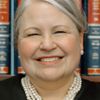Lisa Payne Jones
2024 - Present
2031
1
Lisa Payne Jones is a judge for Division 2 of the Kentucky Court of Appeals 1st Appellate District. She assumed office on April 29, 2024. Her current term ends on January 6, 2031.
Payne Jones ran in a special election for the Division 2 judge of the Kentucky Court of Appeals 1st Appellate District. She won in the special general election on November 5, 2024.
Payne Jones completed Ballotpedia's Candidate Connection survey in 2024. Click here to read the survey answers.
Biography
Lisa Payne Jones was born in Owensboro, Kentucky. She graduated from Owensboro Catholic High School. She earned a bachelor's degree from Brescia University in 1993 and a law degree from the University of Kentucky College of Law in 1996. Her career experience includes working as a judge and assistant commonwealth's attorney.[1]
Elections
2024
See also: Kentucky intermediate appellate court elections, 2024
General election
Special general election for Kentucky Court of Appeals 1st Division 2
Incumbent Lisa Payne Jones defeated Jason Shea Fleming in the special general election for Kentucky Court of Appeals 1st Division 2 on November 5, 2024.
Candidate | % | Votes | ||
| ✔ |  | Lisa Payne Jones (Nonpartisan)  | 63.1 | 119,548 |
 | Jason Shea Fleming (Nonpartisan) | 36.9 | 69,768 | |
| Total votes: 189,316 | ||||
 = candidate completed the Ballotpedia Candidate Connection survey. = candidate completed the Ballotpedia Candidate Connection survey. | ||||
| If you are a candidate and would like to tell readers and voters more about why they should vote for you, complete the Ballotpedia Candidate Connection Survey. | ||||
Do you want a spreadsheet of this type of data? Contact our sales team. | ||||
Nonpartisan primary election
The primary election was canceled. Incumbent Lisa Payne Jones and Jason Shea Fleming advanced from the special primary for Kentucky Court of Appeals 1st Division 2.
Endorsements
Ballotpedia did not identify endorsements for Payne Jones in this election.
2014
See also: Kentucky judicial elections, 2014
Jones ran for re-election to the 6th District Court.
General: She was unopposed in the general election on November 4, 2014.
[2]
2010
- See also: Kentucky judicial elections, 2010
Jones ran unopposed and was retained to the 6th District Court on November 2, 2010, in the general election.[3][4]
Campaign themes
2024
Ballotpedia survey responses
See also: Ballotpedia's Candidate Connection
Lisa Payne Jones completed Ballotpedia's Candidate Connection survey in 2024. The survey questions appear in bold and are followed by Payne Jones' responses. Candidates are asked three required questions for this survey, but they may answer additional optional questions as well.
| Collapse all
- Experience. In my 22 years of judicial experience I’ve presided over trials and appeals; family court matters; juveniles and adults; felonies, misdemeanors, and speeding tickets; civil, probate, and small claims; domestic violence; drug court; and mental health court. I know that whether a case seems big or small to outsiders, to that person in front of the bench, how I treat them and explain my decision affects their view of the entire justice system. Experience has taught me that, more than winning or losing, people care about being heard, being treated with respect, understanding the process, and believing they were treated fairly.
- Integrity means honesty, transparency, and upholding the trust of the people and their faith in the justice system. In my experience there have been times that a case doesn’t turn out the way I thought it would or thought it should. Integrity means putting aside those personal feelings and upholding the law. Judicial races are nonpartisan and judges are bound by a code of ethics which forbids them from acting in such a way that brings into question their impartiality and nonpartisan status. This means judges must work to establish the trust of voters by their conduct and their reputation, not with partisan labels. Integrity, like trust, isn’t built overnight. I’m proud to have earned the trust of people from all parties and backgrounds.
- Faithfulness to the Law. The words conservative and liberal are loaded with hidden messages, but they have a very unique meaning for judges. A conservative judge is true to the law and the Constitution. Liberal judges disregard precedent and sound legal principles. Liberal judges can be Republican or Democrat, male or female, black or white, religious, agnostic or atheist…and so can conservative judges. Every judge should strive to be conservative. When judges fail to follow or uphold the law, faith in the justice system, and in the independence and impartiality of judges suffers. A good judge must balance the law, the people, their responsibility, and the justice system with compassion and a clearly written opinion to light the way.
Note: Ballotpedia reserves the right to edit Candidate Connection survey responses. Any edits made by Ballotpedia will be clearly marked with [brackets] for the public. If the candidate disagrees with an edit, he or she may request the full removal of the survey response from Ballotpedia.org. Ballotpedia does not edit or correct typographical errors unless the candidate's campaign requests it.
Campaign finance summary

See also
External links
|
Candidate Kentucky Court of Appeals 1st Division 2 |
Officeholder Kentucky Court of Appeals 1st Division 2 |
Personal |
Footnotes
- ↑ Information submitted to Ballotpedia through the Candidate Connection survey on October 13, 2024
- ↑ Kentucky Secretary of State, "Election: 2014 Primary Election: District Judge," accessed February 5, 2014
- ↑ Kentucky State Board of Elections, "2010 Primary Election Results," July 14, 2010
- ↑ Kentucky State Board of Elections, "2010 General Election Results," October 27, 2011
| Political offices | ||
|---|---|---|
| Preceded by Donna Dixon |
Kentucky Court of Appeals 1st Division 2 2024-Present |
Succeeded by - |
| Preceded by - |
Kentucky 6th District Court -2024 |
Succeeded by - |
Federal courts:
Sixth Circuit Court of Appeals • U.S. District Court: Eastern District of Kentucky, Western District of Kentucky • U.S. Bankruptcy Court: Eastern District of Kentucky, Western District of Kentucky
State courts:
Kentucky Supreme Court • Kentucky Court of Appeals • Kentucky Circuit Courts • Kentucky District Courts • Kentucky Family Court
State resources:
Courts in Kentucky • Kentucky judicial elections • Judicial selection in Kentucky






